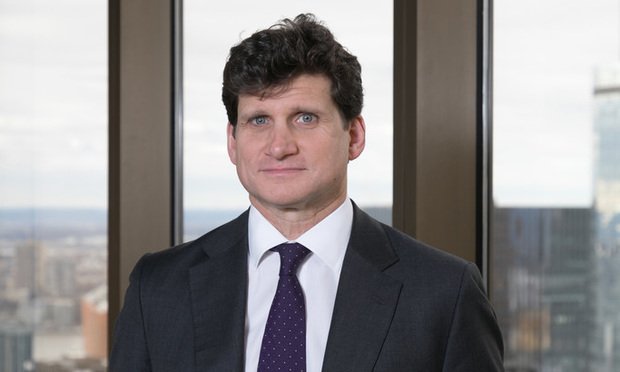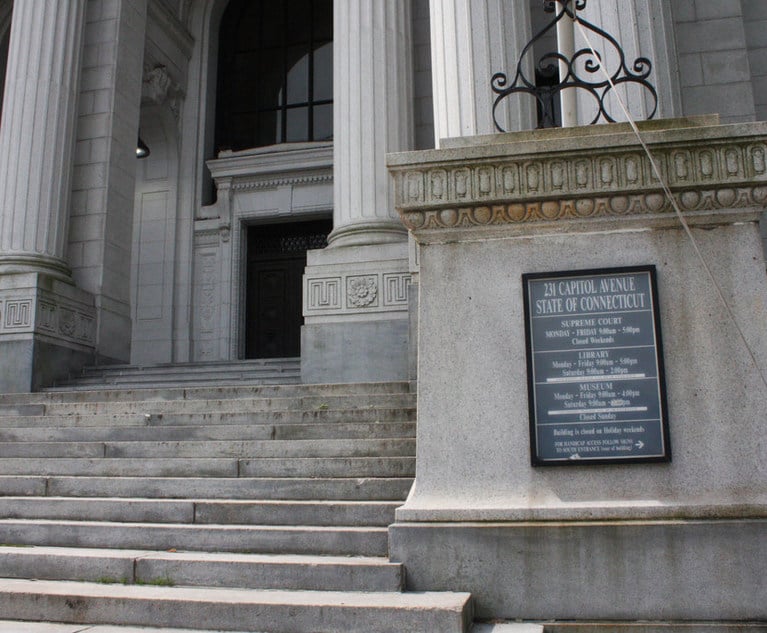Caplan Set to Become the Next Member of the Big Law Felons Club. Now What?
The former Willkie chair certainly is not the first Big Law partner to find himself on the wrong side of the law, but this is not your average, stole-from-an-IOLTA-account, bad lawyer story.
April 08, 2019 at 11:51 AM
8 minute read
The original version of this story was published on Law.com
 Gordon Caplan
Gordon Caplan
“Every part of him was cool and wet moving swiftly through the water, nothing, nothing in his way.”
That's a quote from the yearbook page of ex-Willkie Farr & Gallagher co-chairman and Greenwich, Connecticut resident Gordon Caplan, who graduated from Manhattan's Trinity School, in 1984. It turns out I know several of his classmates, who shared the yearbook.
I have reservations about mining high school yearbooks a la Brett Kavanaugh for insight into a man 35 years later. But this particular quote—a standalone sentence on his page that's attributed to “G.R.C”—Caplan's initials— is so striking in its imagery. His exact reference is unclear, but it suggests a slippery, stealthy person racing ahead without obstacles.
Not anymore.
Caplan's attorneys on Friday said he plans to plead guilty to conspiracy to commit mail fraud and honest services mail fraud—charges which carry a maximum of 20 years in prison—in connection with the college admissions scandal.
 Gordon Caplan, in the year book of Trinity School in New York, 1984.
Gordon Caplan, in the year book of Trinity School in New York, 1984.It's a spectacular downfall, from The American Lawyer's “Dealmaker of the Year” in 2018 to being fired last week by Willkie Farr and facing certain disbarment as an admitted felon.
Caplan is certainly not the first Big Law partner to find himself on the wrong side of the law, but this is not your average, stole-from-an-IOLTA-account, bad lawyer story.
It's headline news: A heady mix of celebrities—other defendants include actresses Lori Loughlin and Felicity Huffman—plus wealth and privilege, all laid bare to confirm our worst suspicions that elites are gaming the system. The story, as they say in the news business, has legs. It's not going away, and people won't quickly forget it. Moreover, Caplan has the misfortune of having been recorded delivering one of the most damning and widely quoted lines in the 204-page affidavit: “It's just, to be honest, I'm not worried about the moral issue here.”
Ouch.
So what will become of him now?
 His attorney Joshua Levy at Ropes & Gray did not respond to a request for comment, but I think it's safe to assume Caplan will not be getting anything close to 20 years behind bars. It's even conceivable he won't get any time at all, maybe just supervised release, community service and a fine.
His attorney Joshua Levy at Ropes & Gray did not respond to a request for comment, but I think it's safe to assume Caplan will not be getting anything close to 20 years behind bars. It's even conceivable he won't get any time at all, maybe just supervised release, community service and a fine.
Because as much as we the nation are collectively disgusted and angry, Caplan has one of the more sympathetic criminal motives: He wanted to help his daughter get into a good college.
Yes, he demonstrated the ethical compass of shark (“Cool and wet, moving swiftly through the water”?), but still. Who doesn't want to help their kid?
By comparison, other ex-Big Law partners currently doing time share a far less laudable motive: Greed.
For example, former Akin Gump Strauss Hauer & Feld partner Jeffrey Wertkin is currently incarcerated at a minimum security prison camp in Talladega, Alabama, where he's slated for release on January 24, 2020, according to the Federal Bureau of Prisons.
Wertkin pleaded guilty in late 2017 to stealing sealed whistleblower complaints from the Justice Department before he left his job there to join Akin Gump. He then attempted to sell one of the complaints for $310,000 to an undercover FBI agent.
Or take Evan Greebel, Martin Shkreli's former attorney and co-defendant. The former partner at Katten Muchin Rosenman and Kaye Scholer is doing time at FCI Otisville in New York (named one of America's 10 cushiest prisons by Forbes), where he's slated for release on Feb. 5, 2020. He was convicted of conspiracy to commit wire fraud and conspiracy to commit securities fraud, working with Shkreli on what prosecutors called an elaborate Ponzi scheme.
Keila Ravelo, a former partner at Hunton & Williams and Willkie Farr, admitted to cheating the firms and a former corporate client, Mastercard Inc., in a $7.8 million fraud involving dummy litigation support companies. She's at FPC Alderson in West Virginia (the same prison camp where Martha Stewart did her time), scheduled for release on May 23, 2023.
There's also Walter “Chet” Little, an ex-partner at Foley & Lardner and Bradley Arant Boult Cummings. He pleaded guilty in late 2017 to one count of conspiring to commit securities fraud, using confidential client information about mergers, earnings and other events to make stock trades. Little is doing his time at FCP Montgomery in Alabama (also on the cushy prison list), due to get out this year on December 13.
And then what happens? What do once high-flying ex-lawyers do with themselves after they've served their time?
There's no common answer.
Plaintiffs giant Melvyn Weiss, who pleaded guilty to one count of racketeering conspiracy, retired to Florida and did a lot of fishing. He died last year.
His former partner William Lerach, who also went to prison, is mounting a comeback of sorts. The Financial Times reported in September that Lerach and his company, Pension Forensics, “are acting as consultants to his lawyer wife, Michelle Ciccarelli Lerach, in a lawsuit against Blackstone and KKR in Kentucky state court over losses in one of the state's largest pension plans.” The FT reports that the suit “is already being blamed for private equity and hedge fund managers pulling their business from Kentucky.”
Likewise, former Greenburg Traurig lawyer/ lobbyist Jack Abramoff, who served 43 months in prison in connection with a bribery scandal, is back working as a political operative. EE news reported in February that Abramoff is now the honorary chairman of the Protect American Values political action committee and has been sending out fundraising emails attacking efforts to combat climate change.
Former DOJ official Robert Coughlin II, who was caught up in the Abramoff scandal for accepting meals and gifts in exchange for favors, was sentenced in 2008 to three years of supervised release. In 2016, he had his law license restored by the D.C. Bar.
But the most feel-good post-prison story is that of Dickie Scruggs, the legendary plaintiffs lawyer who made a fortune suing the tobacco and asbestos industries. In 2008, he pleaded guilty to attempting to bribe a judge and was sentenced to five years in prison.
Mississippi-based Oxford Magazine in 2017 ran a lengthy profile of Scruggs, where he spoke of his time behind bars.
Because of his wealth and the fact that he had a home in the Bahamas, he was considered a flight risk. No cushy minimum security prison for him—he did the first portion of his sentence with hardened criminals. “It was like a casting call of 'The Walking Dead,'” he told David Magee writing for Oxford.
Eventually he was transferred to a lower-security facility and landed one of the most coveted prison jobs—as a teacher, helping fellow inmates earn high school equivalency degrees.
The experience inspired in him a crusade to improve adult education. After Scruggs was released from prison in 2013, he founded a nonprofit dedicated to adult basic education called Second Chance Mississippi. It now has a formal relationship with Mississippi's community colleges system and focuses on education and job training for adults.
Magee described dining out with Scruggs, who is now 72, in Oxford. “[I]t feels at times like being at the table with Archie Manning or Robert Khayat, since most everybody knows him and showers him with adoring affection.”
Scruggs described himself as “happier today than I have ever been before.” And he quoted Rhett Butler (one of the books he had time to read in prison was “Gone with the Wind”): “Until you've lost your reputation, you never realize what a burden it was or what freedom really is.”
Whether Caplan will come out on the other side a changed man is unknown, but at least there's the hope of finding something better in the end.
Read more:
Willkie Cuts Ties as Gordon Caplan Plans Guilty Plea in College Cheating Case
Willkie's Gordon Caplan Appears in Court to Face College Admissions Charges
We hope you enjoyed this excerpt from Litigation Daily, the exclusive source for sharp commentary on mega court battles, winning strategies and the issues that obsess elite litigators. Click here to subscribe.
This content has been archived. It is available through our partners, LexisNexis® and Bloomberg Law.
To view this content, please continue to their sites.
Not a Lexis Subscriber?
Subscribe Now
Not a Bloomberg Law Subscriber?
Subscribe Now
NOT FOR REPRINT
© 2025 ALM Global, LLC, All Rights Reserved. Request academic re-use from www.copyright.com. All other uses, submit a request to [email protected]. For more information visit Asset & Logo Licensing.
You Might Like
View All
Coerced Confessions and the Burden of Proof Beyond Reasonable Doubt


35 Years After CT's Affordable Housing Act, Progress Remains a Struggle
4 minute readTrending Stories
- 1Rejuvenation of a Sharp Employer Non-Compete Tool: Delaware Supreme Court Reinvigorates the Employee Choice Doctrine
- 2Mastering Litigation in New York’s Commercial Division Part V, Leave It to the Experts: Expert Discovery in the New York Commercial Division
- 3GOP-Led SEC Tightens Control Over Enforcement Investigations, Lawyers Say
- 4Transgender Care Fight Targets More Adults as Georgia, Other States Weigh Laws
- 5Roundup Special Master's Report Recommends Lead Counsel Get $0 in Common Benefit Fees
Who Got The Work
J. Brugh Lower of Gibbons has entered an appearance for industrial equipment supplier Devco Corporation in a pending trademark infringement lawsuit. The suit, accusing the defendant of selling knock-off Graco products, was filed Dec. 18 in New Jersey District Court by Rivkin Radler on behalf of Graco Inc. and Graco Minnesota. The case, assigned to U.S. District Judge Zahid N. Quraishi, is 3:24-cv-11294, Graco Inc. et al v. Devco Corporation.
Who Got The Work
Rebecca Maller-Stein and Kent A. Yalowitz of Arnold & Porter Kaye Scholer have entered their appearances for Hanaco Venture Capital and its executives, Lior Prosor and David Frankel, in a pending securities lawsuit. The action, filed on Dec. 24 in New York Southern District Court by Zell, Aron & Co. on behalf of Goldeneye Advisors, accuses the defendants of negligently and fraudulently managing the plaintiff's $1 million investment. The case, assigned to U.S. District Judge Vernon S. Broderick, is 1:24-cv-09918, Goldeneye Advisors, LLC v. Hanaco Venture Capital, Ltd. et al.
Who Got The Work
Attorneys from A&O Shearman has stepped in as defense counsel for Toronto-Dominion Bank and other defendants in a pending securities class action. The suit, filed Dec. 11 in New York Southern District Court by Bleichmar Fonti & Auld, accuses the defendants of concealing the bank's 'pervasive' deficiencies in regards to its compliance with the Bank Secrecy Act and the quality of its anti-money laundering controls. The case, assigned to U.S. District Judge Arun Subramanian, is 1:24-cv-09445, Gonzalez v. The Toronto-Dominion Bank et al.
Who Got The Work
Crown Castle International, a Pennsylvania company providing shared communications infrastructure, has turned to Luke D. Wolf of Gordon Rees Scully Mansukhani to fend off a pending breach-of-contract lawsuit. The court action, filed Nov. 25 in Michigan Eastern District Court by Hooper Hathaway PC on behalf of The Town Residences LLC, accuses Crown Castle of failing to transfer approximately $30,000 in utility payments from T-Mobile in breach of a roof-top lease and assignment agreement. The case, assigned to U.S. District Judge Susan K. Declercq, is 2:24-cv-13131, The Town Residences LLC v. T-Mobile US, Inc. et al.
Who Got The Work
Wilfred P. Coronato and Daniel M. Schwartz of McCarter & English have stepped in as defense counsel to Electrolux Home Products Inc. in a pending product liability lawsuit. The court action, filed Nov. 26 in New York Eastern District Court by Poulos Lopiccolo PC and Nagel Rice LLP on behalf of David Stern, alleges that the defendant's refrigerators’ drawers and shelving repeatedly break and fall apart within months after purchase. The case, assigned to U.S. District Judge Joan M. Azrack, is 2:24-cv-08204, Stern v. Electrolux Home Products, Inc.
Featured Firms
Law Offices of Gary Martin Hays & Associates, P.C.
(470) 294-1674
Law Offices of Mark E. Salomone
(857) 444-6468
Smith & Hassler
(713) 739-1250











